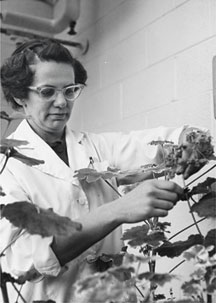Green Pioneer Smashed the Glass Microscope
Prof. Helen A. Stafford

Prof. Helen Stafford [biology 1954–87] was the first Reed professor to win a Guggenheim Fellowship.
Prof. Helen A. Stafford [biology 1954–87] died August 12, 2011, at her home in Portland, after a long struggle with Alzheimer’s disease.
Her interest in plants first blossomed when she gardened beside her father in Philadelphia. “My father was an avid gardener but he had to do everything himself. I was allowed to help him. My father got sick one year and I had to then plant the seeds myself. That just started it all.” Her interest deepened at Wellesley College, where she studied plant physiology, earning a BA in 1944. “Somebody came to give a seminar talk about metabolic biology and I got excited about it. That’s why I like tissue culture, I still like to watch things grow.” A career in science was not easy for a woman at that time, but she was encouraged by her mentors at Wellesley and Cornell, where she worked as a research assistant. She earned a master’s degree from Connecticut College for Women for her groundbreaking thesis on the development of anatomical structures and the effect of light on timothy grass seedlings. Her thesis was published in the America Journal of Botany, the first of more than 70 publications over her career.
To pursue her PhD, she went to the University of Pennsylvania; prejudice nearly prevented her from teaching botany to male students, but she persevered, teaching the course and earning a doctorate in 1951 for her discoveries about plant enzymes. She went to the University of Chicago as a postdoctoral scholar; meanwhile, her exemplary record of research, publishing, and teaching impressed Prof. Lewis Kleinholz [biology 1946–80], who recognized how much she could strengthen the department at Reed. She arrived on campus in 1954 as the only female faculty member in the division of mathematics and natural sciences.
It was a tumultuous time: President Duncan Ballantine [1952–54] resigned her first year and department chair Prof. Ralph Macy [1942–55] the next. Biology was the smallest department at the college, and Prof. Stafford was challenged by the limited facilities available in the basement of Eliot Hall. She began lobbying for grants from the newly organized National Science Foundation and National Institutes of Health—both helped provide resources for research. She and her colleagues worked to integrate classroom teaching with vigorous research by both faculty and students, and transformed the department into one of the top biology programs in the U.S.
She was the first Reed professor to win a Guggenheim Fellowship, which she took at Harvard in 1958. She received unbroken funding of her research from NSF for over 30 years. She also was a member of the reviewing panel for requests for NSF research grants in plant physiology. Her stature within her field led to her serving as commissioner of the Committee for Undergraduate Education in Biological Sciences, and as president of the Phytochemical Society of North America. She was a member of the editorial board of Plant Physiology for nearly 30 years and editor of Recent Advances in Phytochemistry.
Prof. Stafford retired in 1987. Three years later, she published Flavonoid Metabolism, a definitive textbook providing a comprehensive review of the biosynthesis and catabolism of flavonoids and their regulation in plants. In 1996 she received the Charles Reid Barnes Life Membership Award from the American Society of Plant Physiologists—the first woman to receive the honor.
“Professor Stafford has a most well deserved international reputation, a fact all the more striking given that essentially all of her research was conducted at an undergraduate institution,” wrote Norman Lewis, director of the Institute of Biological Chemistry at Washington State University. “Her numerous scientific contributions can be characterized not only as incisive and truly creative, but also ahead of their time. Her studies were superbly conceived, brilliantly executed, and represent a significant and lasting contribution.”
Prof. David Dalton [biology 1987–] stated that Prof. Stafford helped design the highly successful and distinctive attributes for which the Reed biology department is known. “Her career has been a model that demonstrates that it is possible to be successful and productive with research in a setting that strongly emphasizes teaching.”
Prof. Stafford was a pioneer in many ways. Declining the role of firebrand, she worked tirelessly as a mentor and role model for the next generation of women scientists. “We all loved dinners at her house,” wrote Pam Ronald ’82. “I remember that she was a bit annoyed at us vegetarians. ‘Plants have feelings, too,’ she would say.”
“She was a great scientist and a wonderful person,” wrote Jerry Marshall ’82, who was her thesis student.
On the subject of teaching, Prof. Stafford stated, “I have learned to appreciate how deeply students need encouragement, as well as, say, expertise. Typically required to work harder than ever before, expected to comprehend unfamiliar and often difficult subjects, obliged to compete with their peers for the first time, and usually subjected to severer criticisms than ever before, students deserve, not merely need, encouragement.”
Even as she faced the onset of Alzheimer’s, she continued to exhibit the courage and curiosity she was known for with the help of devoted friends and caregivers. A lover of the outdoors and of the dogs who were her constant companions, she found a true home in the Pacific Northwest. Ever frugal, she was able to endow the Morton O. Stafford Jr. Scholarship at Reed in memory of her brother, who was killed in World War II. She is survived by her niece, Anne W. Scarff of Amherst, Massachusetts, who provided many of the details for this memorial piece. She was predeceased by her parents; brother; and sister, Marie Louise S. Scarff. Her ashes have been scattered in the Reed canyon.
Appeared in Reed magazine: December 2011
comments powered by Disqus


![Photo of Prof. Marvin Levich [philosophy 1953–94]](https://www.reed.edu/reed-magazine/in-memoriam/assets/images/2022/LTL-levich1.jpg)
![Photo of President Paul E. Bragdon [1971–88]](https://www.reed.edu/reed-magazine/in-memoriam/assets/images/2020/Bragdon.jpg)
![Photo of Prof. Edward Barton Segel [history 1973–2011]](https://www.reed.edu/reed-magazine/in-memoriam/assets/images/2020/Segel.jpg)








































































